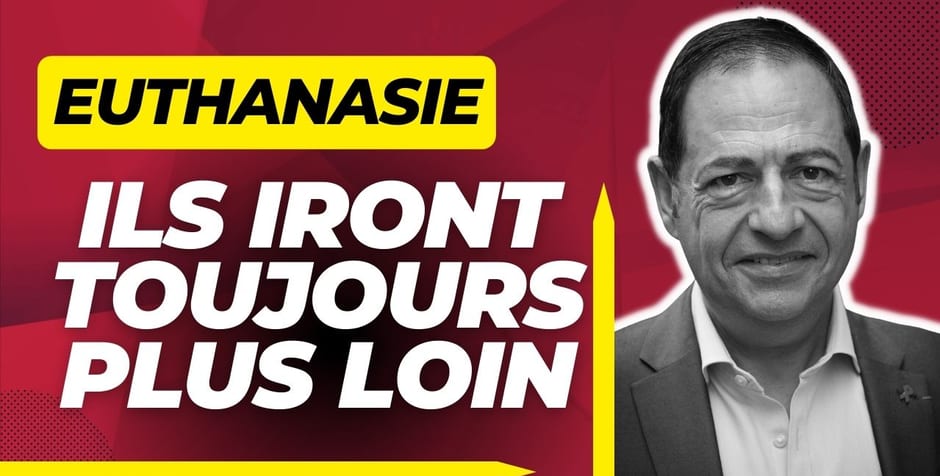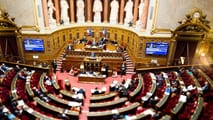The Association pour le droit de mourir dans la dignité (ADMD) is justifiably proud of having initiated the debate on euthanasia and assisted suicide in France, imposing its ideas and even its vocabulary. It has the ear of the government and holds the pen of members of parliament, so knowing its thinking is essential to understanding the debate on euthanasia.
While today it confines itself to calling for the legalization of voluntary euthanasia for sick adults, its current restraint on the euthanasia of minors, the disabled or the elderly is purely strategic, and comes down to the technique of double talk.
Asked during the latest ADMD General Meeting whether it would be appropriate to "go further" than the text currently under discussion, to call for the extension of euthanasia to minors, the elderly and people suffering from Alzheimer's disease, Jean-Luc Romero - ADMD's emblematic president until 2021 - replied that there is an internal debate on this question, but that the association "had not wished to go further, saying, strategically, this is not the time". The important thing would be to get "the base" of the law authorizing the principle of euthanasia passed. Later, in a second phase, "as the Belgians have improved their text, we will improve it"; Belgium has, in fact, greatly extended access to euthanasia to minors and depressed people since the initial law. ADMD's restraint is simply a strategy of concealment, so as not to "give a red rag" to opponents, as Jean-Luc Romero puts it, but he adds that if his bill doesn't pass in 2023, we'll have to think about another proposal, "and then perhaps be ten times more radical".
The current president of ADMD, Jonathan Denis, said as much when he wrote in 2022: "As the law legalizing the voluntary interruption of pregnancy, as passed in 1975, was very incomplete, we must fear that the law which will be put to the vote of parliamentarians, in 2023 we are told, will not meet all our demands [...]. We will have to accept concessions that will only be temporary and transitional. Because once the very principle of active assistance has been voted through, the anti-choice front will have been broken and we will finally be able to move forward quickly and move the law towards what we all want: a law of free choice that does not impose any obligations on anyone.[1]"
This kind of double-talk is not new to ADMD. As far back as 1985, Paul Chauvet, President of ADMD, wrote: "It will always be necessary to move forward on two levels: that of today's acceptable demand, and that of the affirmed, confirmed ideal we seek, in order to advance our object[2]".
So what is ADMD's "desired ideal", "ten times more radical" than the government's current bill? The history of ADMD and the euthanasia movement gives cause for concern. It should not be forgotten that these movements stem directly from the eugenics movement of the 1930s, and were often openly in favor of the forced euthanasia of bedridden and handicapped people, and of handicapped newborn babies. To get a clearer idea of ADMD's thinking, you need to go directly to its sources.
A search of ADMD's Bulletins reveals that its position on forced euthanasia was debated again in 1988, when the association's board proposed amending its statutes to state explicitly that it "opposes euthanasia which is not the expression of a person's free and considered will". The aim was to put an end to any ambiguity on the issue. The association's next Bulletin modestly states that this proposal gave rise to great difficulty and was finally rejected[3].
Although ADMD later declared its opposition to "any euthanasia carried out without the request of the person concerned", it did support people prosecuted for euthanizing patients without their consent. This was the case as far back as the 1980s, when ADMD welcomed the acquittal of Pierre Thébault, a nurse who killed an 86-year-old woman with a fractured femoral neck[4], or again in 2013 when ADMD supported Dr Bonnemaison who was prosecuted for poisoning seven patients unable to express their wishes[5].
The practice of forced euthanasia finds theoretical justification in the concept of human dignity espoused by the founders and historical leaders of ADMD. The fact that this association today insists on the importance of the principle of individual autonomy is not contradictory with forced euthanasia, since the principle of respect for individual autonomy stems from the conviction that dignity resides in individual self-control, conscience and will. Death would therefore be preferable to the "indignity" of loss of autonomy. In its Bulletin, ADMD leaders quote Nietzsche: "One should die proudly, when it is no longer possible to live with pride[6]. It is true that the ADMD's highest ideal is not the euthanasia of dying or unconscious people, but the voluntary suicide of people who fear seeing themselves wither away. For Odette Thibault, theorist and co-founder of ADMD, suicide "is the only way to die... alive"[7], it is "the supreme autonomy, the one that defines the human being... before we lose it altogether."[8] As for Senator Henri Caillavet, a former president of ADMD, "conscious suicide is the only authentic act of human freedom[9]". This apology for suicide as an act of freedom is expressed as a counterpoint to an equally extreme fear of physical decline and dependence. For Caillavet, "When we are - dead in ourselves - why maintain a flickering flame allowing only a vegetative existence, if not close to senility? Is it living to no longer be autonomous, to depend on others, to no longer be able to integrate the outside world, and sometimes to be subjected to illusory therapeutic relentlessness? Certainly not[10]."
From this point of view, a being deprived of autonomy and relational capacities would not be, or no longer be, truly human. As Odette Thibault writes, "Any individual who no longer possesses these faculties can be considered in a sub-human or infra-human state, taken to extremes in the case of the profoundly retarded[11]". Consequently, she adds, "many individuals are the living dead, already dead to the human long before the end of their organic life[12]". Killing them would therefore not be murder, since they would already be dead to humanity; nor would it violate their individual autonomy, since they lack it. What's more, ending a life that has become inhuman would preserve their humanity from decay, and would therefore be a good. Here again, Odette Thibault writes: "Prolonging this decline is, in my opinion, one of the most serious attacks on human dignity[13]".
To these arguments about the indignity and inhumanity of the end-of-life stage are added economic considerations, about the social burden of disabled and senile people. Odette Thibault writes of the elderly: "As soon as they are useless, or represent an additional burden, as is the case in times of shortage, we are happy to see them disappear[14]". Another historic ADMD administrator, Albert Cuniberti, adds, in the association's Bulletin : "the determination to preserve a derisory caricature of life for a growing number of elderly people who don't want it, is becoming increasingly expensive and a burden on society that is less and less bearable"[15].
Such quotations are not lacking among the writings of ADMD's founders and leaders. These extreme convictions directly echo the eugenicist and neo-Malthusian origins of the euthanasia movement, and give an idea of what a "ten times more radical" ADMD bill might look like, as well as the direction of the "slippery slope" down which this lobby wants to push French society.
Published in septembre 2023:
_____________
[1] Letter from ADMD, September 27, 2022.
[2] Paul Chauvet, Rapport moral et d'orientation en vue de l'Assemblée Générale du 15 juin 1985, Bulletin de l'ADMD, n°17, avril 1985, p.5 à 13.
[3] Bulletins de l'ADMD, n° 29 et 30, 1988.
[4] Bulletin de l'ADMD, n° 18, October 1985, p. 21.
[5] Euthanasia: Dr Bonnemaison disbarred from the Ordre des médecins - Gènéthique, 28.01.2013.
[6] Nietzsche, Crépuscule des Idoles, trans. Hémery, Gallimard, 1974, p.129 reproduced in Bulletin de l'A.D.M.D. n° 26, December 1987, p. 19.
[7] Odette Thibault, "Should the law be changed? Pourquoi j'ai écrit mon testament de vie," ADMD Bulletin, No. 12, October 1983, p. 20.
[8] Odette Thibault, "Mourir à la carte - J'ai fait un rêve...", ADMD Bulletin n° 24, June 1987, p. 13.
[9] Caillavet, L'euthanasie, un mot qui ne doit pas faire peur, Bulletin de l'ADMD, n°24, Juin 1987, p. 6 et s.
[10] Bulletin de l'ADMD, N°26. Dec. 87, p. 3.
[11] Odette Thibault, La maitrise de la mort, Editions universitaires, 1975, p. 163.
[12] Odette Thibault, La maitrise de la mort, Editions universitaires, 1975, p. 78.
[13] O. Thibault, La maitrise de la mort, Editions universitaires. 1975, p. 196.
[14] La maitrise de la mort (Editions universitaires. 1975. 224 pages), p. 79-80.
[15] Albert Cuniberti, Réflexion d'un septuagénaire sur la vieillesse, la mort, et sur l'A.D.M.D. ; Bulletin de l'ADMD n° 25, septembre 1987, p. 32-35.
SIGNATURES











